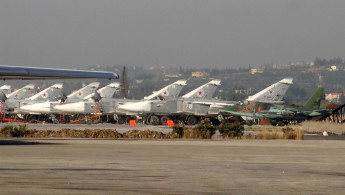Russia: permanent Syria military presence, eyes on Cuba, Vietnam
The development comes against the backdrop of a Syrian army onslaught on the rebel-held eastern part of the city of Aleppo in northern Syria, which has been backed by Russian warplanes.
Since the collapse of a US-Russia-brokered ceasefire last month, ties between Moscow and Washington have grown even more strained.
The US and Russia support opposite sides in the war - Moscow has been a staunch Assad ally and Washington backs Syrian rebels trying to oust him.
Russia's air campaign in Syria, launched a year ago, has reversed the tide of war and helped Assad's forces regain some key ground.
Moscow says the goal of its military operation is to assist the Syrian army in the fight against terrorism. It rejects accusations of targeting civilians.
Lawmakers in the Kremlin-controlled State Duma voted unanimously to approve the deal, which allows Russia to keep its forces at the Hemeimeem air base in Syria's coastal province of Latakia, Assad's Alawite heartland, for as long as it wants.
 |
Lawmakers in the Kremlin-controlled State Duma voted unanimously to approve a deal that will allow Russia to keep its forces at the Hemeimeem air base in Syria |  |
The deal was signed in August 2015 in Damascus, a month before the Russian air campaign began.
Russia also has a naval base in Syria's port of Tartus, the only such outpost outside the former Soviet Union.
That base is not covered by the treaty, and some lawmakers say it could be the subject of a separate deal.
On Thursday, the Russian military warned the US against striking the Syrian army, stressing that Russian air defence weapons in Syria stand ready to fend off any attack.
Russian Defense Ministry spokesman Major General Igor Konashenkov said any US strikes on areas controlled by Assad's government could jeopardise the lives of Russian servicemen, and noted that the range of Russian S-300 and S-400 air defence missile systems would "surprise" any country operating its aircraft over Syria.
During Friday's debates, Russian lawmakers said that Russia should demonstrate its military muscle to deter the US.
Leonid Kalashnikov, a Communist lawmaker, said Moscow must "seriously defend our interests in Syria" in a resolute response to what he and other lawmakers described as Washington's anti-Russian policies.
Syria's government depends on an array of foreign militias, elite Iranian fighters, as well as Russian military intelligence and air power to maintain its fight against the rebels, who also rely on foreign fighters.
Meanwhile, the Russian military is said to be considering the possibility of regaining its Soviet-era bases in Cuba and Vietnam, amid growing US-Russia tensions over Syria.
 |
The Russian military is considering regaining its Soviet-era bases in Cuba and Vietnam |  |
Deputy Defence Minister Nikolai Pankov told lawmakers on Friday that the ministry is considering the possibility of establishing footholds far away from Russia's borders.
Responding to a lawmaker's question if the military could return to Cuba and Vietnam, Pankov said the military is "reviewing" a decision to withdraw from them, but did not offer any specifics.
"As for our presence on faraway outposts, we are doing this work," he said.
In 2001, Russian President Vladimir Putin ordered the military to pull back from Cuba and Vietnam as he sought to bolster ties with the US.
The US-Russian relations now have plunged to the lowest point since the Cold War times amid strain over Syria and Ukraine.
Moscow has lamented that Washington never appreciated Putin's goodwill gesture.
 |
The US-Russian relations now have plunged to the lowest point since the Cold War times amid strain over Syria and Ukraine |  |
Asked Friday about the possibility of the Russian military's return to Cuba and Vietnam, Putin's spokesman Dmitry Peskov refrained from specific comment, but added that the global situation requires various players to mull possible responses.
"Naturally, all countries assess those changes from the point of view of their national interests and take steps they consider necessary," he told reporters.
When Putin ordered the military withdrawal from Cuba and Vietnam, Russia was still reeling from its post-Soviet economic meltdown.
Putin cited the need to cut costs when he explained reasons behind his move to the military.
Windfall oil revenues in recent years have filled the government's coffers with petrodollars, allowing the Kremlin to fund an ambitions weapons modernisation program and turn the military into a more mobile modern force.
Amid the deterioration of ties with the West, the military began pondering plans to re-establish its global presence. A small naval supply facility in the Syrian port of Tartous is now the navy's only outpost outside the former Soviet Union.
Oleg Nilov of A Just Russia, one of the factions in the Kremlin-controlled lower house, pointed at the US and its NATO allies' deployment near Russian borders as he argued that Russia needs to regain its Soviet-era bases "It's time to reach agreements to return to faraway outposts if they don’t understand the language of diplomacy," he said during debates.





 Follow the Middle East's top stories in English at The New Arab on Google News
Follow the Middle East's top stories in English at The New Arab on Google News
![Israeli forces ordered bombed Gaza's Jabalia, ordering residents to leave [Getty]](/sites/default/files/styles/image_330x185/public/2176418030.jpeg?h=a5f2f23a&itok=_YGZaP1z)

